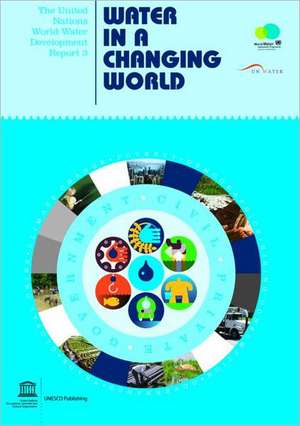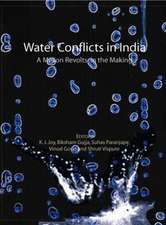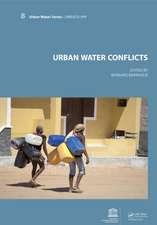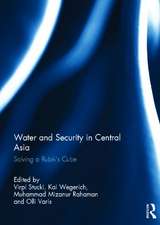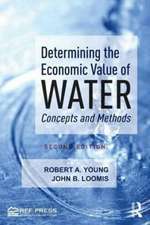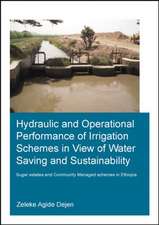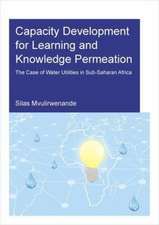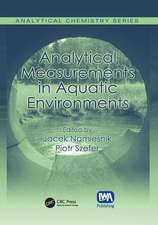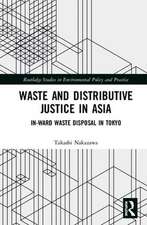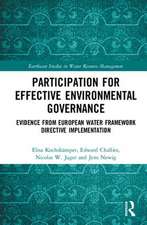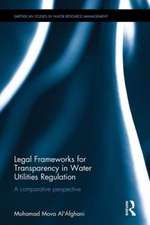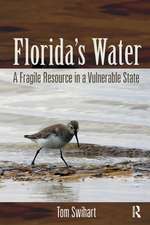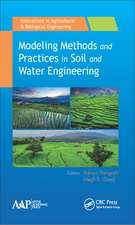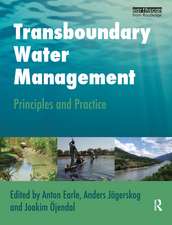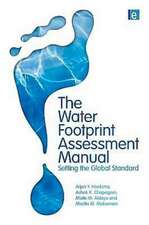The United Nations World Water Development Report 3: Water in a Changing World (Two Vols.)
Editat de World Water Assessment Programmeen Limba Engleză Hardback – 21 apr 2009
| Toate formatele și edițiile | Preț | Express |
|---|---|---|
| Paperback (1) | 371.11 lei 43-57 zile | |
| Taylor & Francis – 21 apr 2009 | 371.11 lei 43-57 zile | |
| Hardback (1) | 1013.01 lei 43-57 zile | |
| Taylor & Francis – 21 apr 2009 | 1013.01 lei 43-57 zile |
Preț: 1013.01 lei
Preț vechi: 1344.17 lei
-25% Nou
Puncte Express: 1520
Preț estimativ în valută:
193.84€ • 202.90$ • 161.34£
193.84€ • 202.90$ • 161.34£
Carte tipărită la comandă
Livrare economică 31 martie-14 aprilie
Preluare comenzi: 021 569.72.76
Specificații
ISBN-13: 9781844078394
ISBN-10: 1844078396
Pagini: 344
Dimensiuni: 210 x 297 x 30 mm
Greutate: 1.91 kg
Ediția:1
Editura: Taylor & Francis
Colecția Routledge
Locul publicării:Oxford, United Kingdom
ISBN-10: 1844078396
Pagini: 344
Dimensiuni: 210 x 297 x 30 mm
Greutate: 1.91 kg
Ediția:1
Editura: Taylor & Francis
Colecția Routledge
Locul publicării:Oxford, United Kingdom
Cuprins
Report Contents:Foreword by Ban Ki-moon, Secretary-General, United NationsForeword by Ko chiro Matsuura, Director-General, United Nations Economic, Scientific and Cultural Organization Preface Acknowledgements Overview of Key Messages Water in a Changing World 1. Getting out of the Box - Linking Water to Decisions for Sustainable DevelopmentPart I: Understanding What Drives the Pressures on Water 2. Demographic, Economic and Social Drivers 3. Technological Innovation 4. Policies, Laws and Finance 5. Climate Change and Possible Futures Part II: Using Water 6. Water's Many Benefits 7. Evolution of Water Use 8. Impacts of Water Use on Water Systems and the Environment 9. Managing Competition for Water and the Pressure on Ecosystems Part III: State of the Resource 10. The Earth's Natural Water Cycles 11. Changes in the Global Water Cycle 12. Evolving Hazards - and Emerging Opportunities 13. Bridging the Observational Gap Part IV: Responses and Choices 14. Options inside the Water Box 15. Options from Beyond the Water Box 16. The Way Forward Appendix 1: World Water Development Report Indicators Appendix 2: Water-Related Goals and Objectives of Major Conferences and Forums, 1972-Present Abbreviations, Data Notes and Units of Measure List of Boxes, Figures, Maps and Tables Index Case Studies Contents:ForewordOverviewSection 1: AfricaCameroonSudanSwazilandTunisiaZambiaSection 2: Asia and the PacificBangladeshChina: the Yellow River basinPacific islandsPakistan: the Cholistan desertRepublic of Korea: the Han River basinSri Lanka: the Walawe River basinUzbekistan: the Aral Sea basinSection 3: Europe and North AmericaEstoniaFinland and the Russian Federation: the Vuoksi River basinItaly: the Po River basinThe NetherlandsSpain: the Autonomous Community of the Basque CountryTurkey: IstanbulSection 4: Latin America and the CaribbeanArgentina, Bolivia, Brazil, Paraguay and Uruguay: La Plata River basinBrazil and Uruguay: Lake Mer n basin
Notă biografică
The World Water Assessment Programme (WWAP), founded in 2000, is the flagship programme of UN-Water. Housed and led by UNESCO, WWAP monitors freshwater issues in order to provide recommendations, develop case studies, enhance assessment capacity at a national level and inform the decision-making process.UN-Water is a mechanism with 25 member agencies to strengthen coordination and coherence among all United Nations bodies that deal with freshwater issues: from water supply, sanitation and health to climate, food, energy, environment, disasters and sustainable water resources management for socioeconomic development. Established in 2003 by the High-Level Committee on Programmes of the United Nations, it evolved from many years of close collaboration among UN agencies. UN-Water is not another agency; through task forces and programmes led and hosted by various members, it adds value to existing activities and fosters cooperation and information sharing among UN agencies and stakeholder representatives.
Recenzii
'Most important guidelines for the whole freshwater crises debate.'Sherkin Comment
